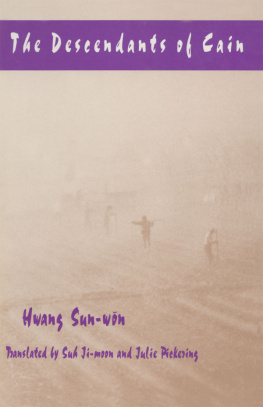Hwang Sun-wŏn - The Descendants of Cain
Here you can read online Hwang Sun-wŏn - The Descendants of Cain full text of the book (entire story) in english for free. Download pdf and epub, get meaning, cover and reviews about this ebook. City: Korea, year: 2015, publisher: Taylor & Francis (CAM);Routledge, genre: Detective and thriller. Description of the work, (preface) as well as reviews are available. Best literature library LitArk.com created for fans of good reading and offers a wide selection of genres:
Romance novel
Science fiction
Adventure
Detective
Science
History
Home and family
Prose
Art
Politics
Computer
Non-fiction
Religion
Business
Children
Humor
Choose a favorite category and find really read worthwhile books. Enjoy immersion in the world of imagination, feel the emotions of the characters or learn something new for yourself, make an fascinating discovery.
- Book:The Descendants of Cain
- Author:
- Publisher:Taylor & Francis (CAM);Routledge
- Genre:
- Year:2015
- City:Korea
- Rating:3 / 5
- Favourites:Add to favourites
- Your mark:
- 60
- 1
- 2
- 3
- 4
- 5
The Descendants of Cain: summary, description and annotation
We offer to read an annotation, description, summary or preface (depends on what the author of the book "The Descendants of Cain" wrote himself). If you haven't found the necessary information about the book — write in the comments, we will try to find it.
The Descendants of Cain — read online for free the complete book (whole text) full work
Below is the text of the book, divided by pages. System saving the place of the last page read, allows you to conveniently read the book "The Descendants of Cain" online for free, without having to search again every time where you left off. Put a bookmark, and you can go to the page where you finished reading at any time.
Font size:
Interval:
Bookmark:
The Descendants of Cain
Contents

First published 1997 by M.E. Sharpe
Published 2015 by Routledge
2 Park Square, Milton Park, Abingdon, Oxon OX 14 4RN
711 Third Avenue, New York, NY 10017, USA
Routledge is an imprint of the Taylor & Francis Group, an informa business
Copyright 1997 by Suh Ji-moon and Julie Pickering. All rights reserved
No part of this book may be reprinted or reproduced or utilised in any form or by any electronic, mechanical, or other means, now known or hereafter invented, including photocopying and recording, or in any information storage or retrieval system, without permission in writing from the publishers.
Notices
No responsibility is assumed by the publisher for any injury and/or damage to persons or property as a matter of products liability, negligence or otherwise, or from any use of operation of any methods, products, instructions or ideas contained in the material herein.
Practitioners and researchers must always rely on their own experience and knowledge in evaluating and using any information, methods, compounds,or experiments described herein. In using such information or methods they should be mindful of their own safety and the safety of others, including parties for whom they have a professional responsibility.
Product or corporate names may be trademarks or registered trademarks, and are used only for identification and explanation without intent to infringe.
Library of Congress Cataloging-in-Publication Data
Hwang, Sun-wn, 1915
[Kain i Huye. English]
The descendants of Cain / by Hwang Sun-wn ;
translated by Suh Ji-moon and Julie Pickering,
p. cm.(UNESCO collection of representative works)
An East Gate book.
ISBN 0-7656-0136-2 (cloth : alk. paper).ISBN 0-7656-0137-0 (paper : alk. paper)
I. Title.
PL991.29.S9K313 1997
895.733dc21
97-2564
CIP
ISBN 13: 9780765601377 (pbk)
ISBN 13: 9780765601360 (hbk)
Born in 1915 while Korea was under Japanese colonial rule, Hwang Sun-wn published his first poem at age sixteen. He published two collections of poems as a student and received a bachelors degree in English literature from Waseda University in Tokyo. In 1940, a year after graduating and returning to Korea, he published his first collection of short stories. Two years later, Japanese colonial authorities outlawed all publication in Korean. Hwang wrote in private, without any assurance that his writings would ever be published. All the while, he lived in hiding to avoid being pressed into forced labor in Japanese mines or war supply factories.
Beautifully crafted, the stories he wrote in those days of anguish are among the best-loved classics of modern Korean literature. In the bitter circumstances of Korea at that time, Hwang explored the timeless life patterns of ordinary people, lovingly commemorating their dreams, hopes, sorrows, and idiosyncrasies.
Liberation from Japanese colonial rule in August 1945 was a joy to every Korean, but Hwang was soon engulfed in the whirlwind of terror created by the establishment of communist rule in the northern half of the peninsula. His experiences as a landlords son in a time of land reform and social turmoil form the basis of The Descendants of Cain.
Published in 1954 in Seoul, The Descendants of Cain (Kain i Huye) was an immediate success and has been a steady best seller ever since. It focuses on a national crisis which changed the course of Korean history and the lives of half the Korean population, vividly depicting the destruction of an old and close-knit society. The traditional Korean way of life remained strong until 194546, when the story in the novel unfolds. Tenant farmers, most of whom had tilled the same land over many generations, were bound by multiple ties to the landlords. The farmers were not the legal property of the landowners, but in a country of limited arable land and little mobility, termination of land tenure meant an utterly disastrous fall to the status of vagabond and pariah. Therefore, the tenants could not assert their rights vis--vis the landowners. It was also impossible for tenants to escape poverty, as the standard rent throughout the country was half the yield and year after year most farmers had to borrow seed grain from their landlords at fifty percent interest.
On the other hand, because land was scarce, farmers were grateful to be allowed to stay on as tenants. They were also heavily reliant on their landlords for emergency relief, seasonal doles, and so on. Most importantly, peasants accepted their lot as their fate. Having had their lives interwoven with the landlords family over many generations, their loyalty was almost second nature to them. It is true that Japanese colonial rule weakened the power and authority of the yangban classto which most landowners belongedby forcing them ultimately to give up even their proud names and adopt Japanese ones. Japans exploitation of Korea, from 1910 to 1945, which culminated in the massive conscription of manpower and collection of grain and metal goods during World War II, reduced the country to famine and despair. Social structure and social ties were weakened thereby, but the centuries-old relationship between landlord and tenant did not disintegrate entirely until the communists came to power and enforced land reform.
The communists denounced intellectuals as well as landlords because most educated people were from the landowning class, and in traditional Korean society the yangban class monopolized power by monopolizing learning. Hun, the central male character of The Descendants of Cain, is a typical heir of the Korean landowning class. His utter passivity may seem puzzling to Western readers, but his gentle upbringing renders him helpless against brute force and raw emotions. Ojakny, a woman of boundless courage and tenacity when it comes to serving and protecting the man she loves but who is at the same time totally selfless in her relationship with him, embodies to Korean men the eternally feminine. It is worth noting that she comes from the class one rung down the social ladder, and not from the yangban class for whom dignity was supposedly more important than life itself.
The Descendants of Cain exhibits many, though by no means all, of Hwang Sun-wns strengths as a writer. The political frenzy and the dark apprehensions it creates are related in simple, spare prose. The emotional tension in Hun and Ojakny are palpable. Devoid of hyperbole, the novel demonstrates the nobility, cunning, and cruelty latent in the human character, which are brought out by unexpected historical developments. It is a portrait of a society in violent transition. Almost everyone is transformed, including Hun, who surprises himself at the end by deciding to flee with a married woman, something unthinkable under the dictates of conventional morality.
Hwang Sun-wn has also written more than one hundred short stories, covering a wide range of subjects and moods, all delicate yet forceful, capturing the personalities, aspirations, and emotions of his characters. Hwangs longer works written in his later years are more ambitious, attempting to examine social and existential life in the context of history and institutions. The Sun and the Moon (Ilwl, 1964) probes the essential isolation of all human beings by examining the inner conflicts of a rich young man who discovers that his family is descended from a line of butchers, despised social outcasts in traditional Korean society. The young man finally realizes that recovery from existential alienation can begin only with acceptance of who he is.
The Moving Castle
Next pageFont size:
Interval:
Bookmark:
Similar books «The Descendants of Cain»
Look at similar books to The Descendants of Cain. We have selected literature similar in name and meaning in the hope of providing readers with more options to find new, interesting, not yet read works.
Discussion, reviews of the book The Descendants of Cain and just readers' own opinions. Leave your comments, write what you think about the work, its meaning or the main characters. Specify what exactly you liked and what you didn't like, and why you think so.








